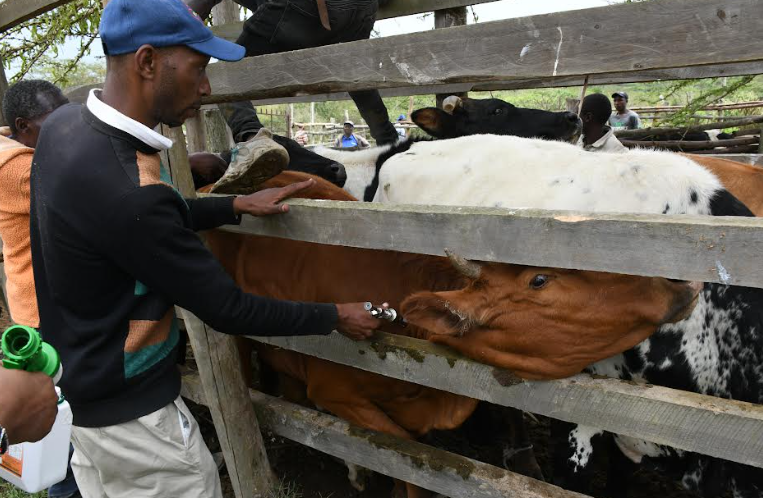Teresa Gitonga, a small-scale poultry and livestock farmer in Lusio, Nyeri County has a small corner in her house that is specifically dedicated to storage of livestock medicines and remedies.
She keeps some for her goats and the others for her brood of chicken. She knows by heart which drug to use and the dosage is sufficient based on the symptoms they display. However, her cows are a lucky lot as they have to wait for her to call a vet to treat them whenever they are unwell. She says that the only reason she doesn’t keep drugs for her cows is because purchasing them over the counter is a tall order due to their cost.
For years, Teresa has relied on her tried and tested skills to treat her livestock until last week, when the County Directorate of Veterinary Services and the World Animal Protection organized a farmers’ sensitization session to create awareness on Anti-Microbial Resistance (AMR). She remained oblivious to what AMR is and the risk she has been exposing herself and her animals to by relying on her knowledge and the drugs she was buying from a nearby agro vet to treat her livestock.
“I am guilty of using shortcuts. Many times I just reach out to my stock in the house and without consulting a vet I just administer the drugs to my goats. For the poultry, if I don’t have the drug, I usually visit an agro vet and describe the symptoms to the attendant and seek advice,” she says.
Antimicrobials are agents used to prevent the possibility of contracting infections. AMR is the inability of bacteria, viruses, fungi and parasites to respond to antimicrobial medicines meant to kill them, making the drugs ineffective.
The farmers’ sensitization session in Lusoi coincided with the annual commemoration of the World Antimicrobial Awareness Week. The week is dedicated to raising awareness and understanding of AMR, promoting best practices among stakeholders, members of the public and farmers like Teresa on how to reduce the emergence and spread of drug-resistant infections.
This year’s theme, ‘Educate. Advocate. Act now’ was chosen based on feedback from an online survey among stakeholders from the human, animal, plant, and environmental health sectors, on the urgent need to educate stakeholders on AMR, advocate for bold commitments and take concrete actions in response to AMR.
It also comes at a time when animal welfare groups are appealing to livestock farmers to take urgent action to reduce the overuse of antibiotics in animal treatment which they say is a leading cause of AMR.
According to Dr Patrick Muinde, the Research Manager at World Animal Protection, there is a link between industrial animal agriculture and the rise of AMR. Speaking during a Webinar to mark this year’s World Antimicrobial Awareness Week yesterday, Dr Muinde noted that antibiotics are routinely being used in intensive farming systems to not only treat infections but also to compensate for poor living conditions in animals. Additionally antibiotics are often administered as growth promoters or as preventive treatments, even when animals are not sick and it is through these practices that many farmers are exposing themselves and their livestock to AMR.
“This widespread misuse accelerates the development of resistant bacteria that can then be transmitted to humans through the food chain, direct contact with animals, or environmental contamination, “stated Dr Muinde.
“The future of our food systems depends on transforming agriculture to be more humane and sustainable, reducing the spread of AMR. By reducing our reliance on antibiotics in farming and adopting practices that prioritize animal welfare, we can build a healthier future for both people and animals,” he added.
Back in Lusio and the farmers are taken aback by preliminary findings from an ongoing base line survey that is being conducted by the County Directorate of Veterinary Services, World Animal Protection and the Jomo Kenyatta University of Agriculture and Technology. From the livestock stool and milk samples collected from their cows and pigs mid this year, the results show some AMR in livestock. An analysis showed high resistance to some of the local antibiotics namely Streptomycin, Penicillin, Tetracycline and Biocilin that are used to treat infections in animals.
Similarly, the preliminary finds showed that farmers in Lusoi were in the habit of purchasing drugs over the counter and administering them without the help of professional veterinary doctors. The researchers also found out that the farmers did not observe the withdrawal period-the time recommended by drug manufacturers to allow the medicine to clear from the animal’s body before consuming some of its products such as milk or slaughtering it for meat.
“The milk and stool samples indicate some form of AMR. For instance, in our investigations we got 100 per cent resistance by the Penicillin drug in responding to the E-coli bacteria. Many farmers do not know that antibiotics were meant to only treat bacterial diseases and when you use antibiotics to treat disease caused by a virus, it won’t work but the body starts to build resistance against the drug,” said Emma Mugo, one the Graduate Assistants working on the Survey.
According to the County Director of Veterinary Services Dr Anthony Muguro, all is not lost. By exercising proper hygiene, adhering to routine vaccination and responsible use of antibiotics, farmers can reduce the risk of AMR. Speaking during the farmers’ sensitization session in Lusoi, Dr Muguro also emphasized on the need for farmers to strictly adhere to prescriptions and to seek professional veterinary services.
“We are developing resistance due to poor use of drugs and by extension by failing to follow the instructions from the vets. The process of developing the drugs we use to cure diseases takes a very long time so we should be very careful to prevent a situation where humans or livestock are resistant to our current stock of drugs,” said Dr Muguro.
By Wangari Mwangi





